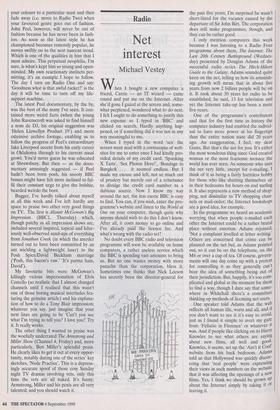Radio
Net interest
Michael Vestey
When I bought a new computer a friend, Carrie — an IT wizard — came round and put me on the Internet. After she'd gone I gazed at the screen and, some- what perplexed, wondered what to do next. I felt I ought to do something to justify this new expense so I typed in 'BBC' and clicked on search. Hardly anything hap- pened, or if something did it was not in any way meaningful to me.
When I typed in the word 'sex' the screen went mad with a cornucopia of web- sites for me to enter once I had kindly pro- vided details of my credit card: 'Spanking X Tarts', 'Sex Photos Here!', 'Bondage in Bangkok' . . . it seemed endless. But I made my excuse and left, not so much out of prudery but merely out of a reluctance to divulge the credit card number to a dubious source. Now I know my way around the net, the less exotic BBC is easy to find. You can, if you wish, enter the pro- gramme's website and listen to the World at One on your computer, though quite why anyone should wish to do this I don't know. After all, it costs money to go online and I've already paid the licence fee. And what's wrong with the radio set?
No doubt every BBC radio and television programme will soon be available on home computers, a rather useless service which the BBC is spending vast amounts to bring us. But no one wastes money with more panache than the corporation, bless it. Sometimes one thinks that Nick Leeson has secretly been the director-general for the past five years; I'm surprised he wasn't short-listed for the vacancy caused by the departure of Sir John Birt. The corporation does still make programmes, though, and they can be rather good.
I only mention computers this week because I was listening to a Radio Four programme about them, The Internet: The Last 20th Century Battleground (Wednes- day) presented by Douglas Adams of the successful radio series The Hitch-Hikers Guide to the Galaxy. Adams sounded quite keen on the net, telling us how its astonish- ing growth will mean that in about five years from now 2 billion people will be on it. It took about 30 years for radio to be established, he said, 13 for television and yet the Internet take-up has been a mere five years.
One of the programme's contributors said that for the first time in history the computer industry had enabled the individ- ual to have more power at his fingertips than the entire nation state did 20 years ago. An exaggeration, I feel, my dear Gates. But that's the net for you. It's either the most wondrous thing since God created woman or the most fearsome menace the world has ever seen. As someone who uses the net very little, except for e-mailing, think of it as being a fairly harmless hobby for those who like shutting themselves up in their bedrooms for hours on end surfing it. It also represents a new method of shop- ping, not dissimilar to TV shopping chan- nels or mail-order; the Internet bookshops are a good idea, for example.
In the programme we heard an academic worrying that when people e-mailed each other the Internet could be a rather brutal place without emotion. Adams rejoined, `Not a complaint levelled at letter writing.' Others are concerned that crime can be planned on the net but, as Adams pointed out, so it can be on the telephone, on the M4 or over a cup of tea. Of course, govern- ments will one day come up with a pretext for controlling it as they generally can't bear the idea of something being out of their jurisdiction. But, happily, it's too com- plicated and global at the moment for them to find a way, though I dare say that some- where in Whitehall there's a committee thinking up methods of licensing net users. One speaker told Adams that the web reflects all human life, warts and all, and if you don't want to see it it's easy to avoid, just as I found it simple to avert my gaze from 'Fellatio in Florence' or whatever it was. And if people like clicking on to Harry Knowles to see what others are saying about new films, all well and good. Knowles, it seems, set up the 'Ain't it Cool' website from his back bedroom. Adams told us that Hollywood was quickly discov- ering that 'real people' were expressing their views in such numbers on the website that it was affecting the openings of a new films. Yes, I think we should be grown 1-1P about the Internet simply by taking it or leaving it.


























































 Previous page
Previous page